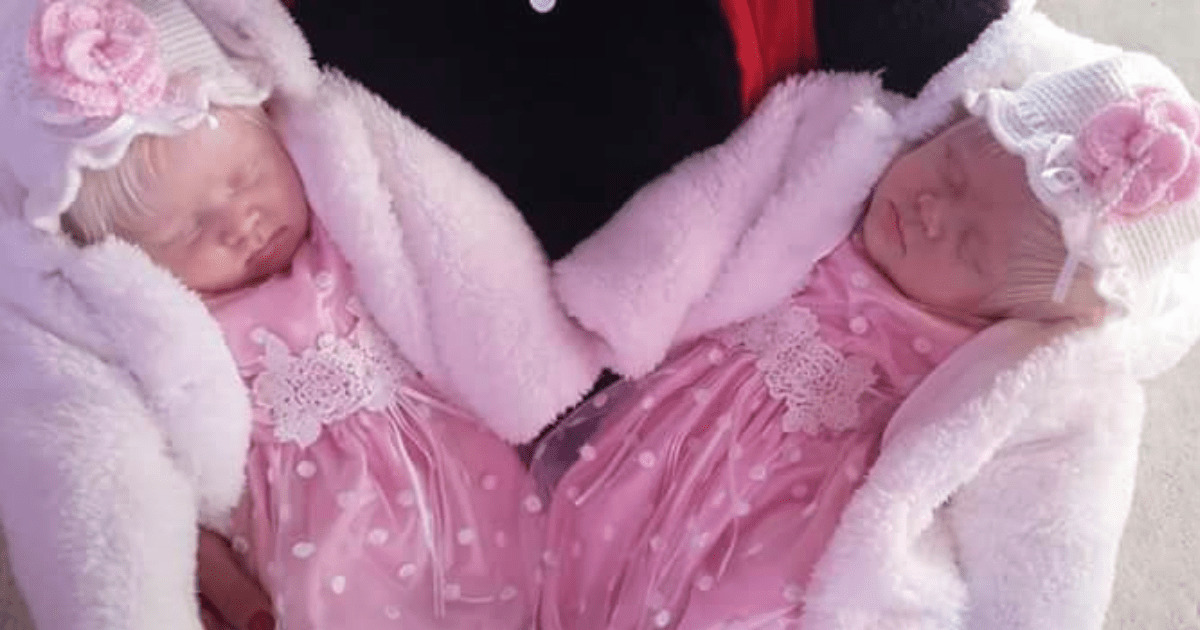
Every pregnant couple faces extreme joy and a certain degree of nervousness ahead of their child’s birth… so learning that you’re pregnant with twins is no doubt double the stress, but also double the joy.
For one couple in particular, the surprise of having twins would grow even further after they took one look at their two, snow white babies…
Indeed, Argentinians Jorge Gomez and his wife never imagined the kind of international attention their two sweet girls would receive following their birth in 2018.
Double the Excitement
When Mr. and Mrs. Gomez discovered they were pregnant in 2018, they were overjoyed. They couldn’t wait to make their first-born son a big brother and complete their family.
Like any other responsible pregnant couple, they made sure to visit the doctor regularly for check-ups and to ensure that everything was moving along smoothly. It was on one such visit that they discovered the incredible news that they had not one, but two babies on the way: a set of twin girls.
The challenge of carrying and delivering not one but two children comes with a certain degree of risk, but Mrs. Gomez experienced a relatively normal pregnancy.
Throughout it all, the Gomez’s were overjoyed and could hardly wait to welcome their two new baby girls to the world. The usual preparations ensued, such as setting up the appropriate space for their soon-to-come bundles of joy.
Rarer than Rare
But there was one thing they were not at all prepared for. When the very special twin girls at last entered the world at a hospital in Tucuman province, Argentina, they were 36 weeks premature. Despite this, the two little fighters, Catalina and Virginia, weighed healthy.
Catalina was first, coming in at 5.95 lbs. Two minutes later came Virginia, weighing 5.5 lbs. But their healthy weight despite being premature was far from the biggest surprise. Catalina and Virginia both emerged with snow white hair – and looked nothing like their parents.
As it turned out, the little girls were born with albinism, a rare genetic disorder that causes a lack of pigmentation in the skin. For example, only one in 17,000 babies is born with albinism in the U.S. Albinism is passed down (inherited) through families, and for most types, both parents must carry an albinism gene.
“When they gave us the news that we would have two babies, it gave us a lot of happiness and when they were born and we saw that they were albinos, that happiness did not change at all. For us it is a blessing,” Jorge told a local newspaper.
Amazingly, when Catalina and Virginia were born, they became the first set of albino twins born in Argentina.
Double the Preciousness
Their rare genetic disorder came as a shock for everyone. But both Jorge and his wife also felt blessed with their new additions.
“When they gave us the news that we would have two babies, it gave us a lot of happiness and when they were born and we saw that they were albinos, that happiness did not change at all,” dad Jorge told LV12.
However, the twins also come with additional safety concerns which have to be taken into consideration. One example, is that, like all individuals born with albinism, the girls are extremely sensitive to UV rays, and so the Gomez’s have to be extra cautious at all times when it comes to sun protection.
A Bright Future
This year, Catalina and Virginia turn four years old, and as they are growing up, they are getting more and more beautiful every day.
In December 2021, the girls posed in some dresses a close family friend had designed for them.
Hopefully, their story and these pictures will shed some light on albinism and show how uniquely beautiful albino people can be.
Most importantly, the Gomez’s have proven that every child deserves to be loved deeply and without judgment, no matter their genetic predisposition.
How cute are they! I believe that Catalina and Virginia’s story teaches us that all children deserve to be loved and appreciated irrespective of their genetic makeup.
If you enjoyed seeing their adorable faces, please make sure to share this article with your family and friends.




